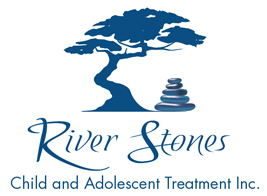How quickly our kids transform from cute cuddly beings that adore us, to pimply, hormonal mysteries of volatile emotion that don’t seem to need us anymore. What used to work doesn’t any more. They aren’t as interested in us. They used to think we knew everything, now they think we know nothing. We quickly find ourselves without a map lost at sea.
Author David Oldfield eloquently posed: “Does an hour pass without a teenager drowning in the excess of one thing or another: energy, embarrassment, exasperation, ennui? We can only hope to weather the emotional storms of this age”…and a storm it is! Another author refers to it as, “the necessary crisis of adolescence”. We often find ourselves reeling, being tossed about by forces bigger than us and far outside our comfort zone.
In my work with parents of teens over more than two decades at River Stones Teen Treatment, I often use the metaphor of a storm to describe adolescence. It just seems to fit. When you are on a boat in a storm,
you can’t control the weather…
…you can only snap into known protocols that increase your chances of survival: batten down the hatches, drop the sail and head the nose into the wind. After you have followed the protocols as you know them, your only role now is to ride it out.
This is adolescence: the necessary storm, a crisis of sorts. And if we are not prepared and have the right equipment and protocols, depending on the intensity of the storm, we may not come out well on the other side, and there will be scars to show for it.
The protocols don’t change the weather, nor are they guaranteed to spit you out on the other end of it unscathed and a bit battered and bruised. They do one thing and one thing only: increase your chances of survival until it passes with the vessel intact. In this case the vessel is the relationship. How do we behave and respond to their confusing and challenging behavior in such a way that ultimately protects and preserves the relationship and help them through the storm.
Different Storms; Different Teens
I calculate that in my career I have worked intimately with over 1000 teens and their families over the years, and one thing I can say is that they are not all the same. Depending on their histories, models, temperament, personal and genetics, some are much more challenging than others. But most are difficult in their own way by developmental definition. Some storms, though challenging and pose some fear of threat, turn out to be quite manageable and we come out on the other side relatively unscathed and better for the wear.
Others may experience a little weather but mostly it’s the kind of weather that poses little threat and you are even able to enjoy the “seasons” it poses. However, there’s a decent chance that if you have stumbled on this blog, you may experiencing something a bit more daunting and treacherous and are looking for a quick training in some protocols to get you through it.
In this series of blogs, I will share with you some of the principles, protocols and practices that I have learned over the past 25 years of working with challenging teens in a residential treatment setting, to help you weather the storm of adolescence with your teen and to help your family flourish.
One thing to hold on to while you are learning about these ideas and skills: protocols and practices don’t change the weather. They do however, significantly increase the chances of having a more peaceful family, a more successful teen and a healthier relationship in the process.
We start with acknowledging that ultimately we cannot totally control our teen, and ultimately we don’t really want to. We really should seek to foster an environment where they find their way, as they separate from us, develop their own set of values, identity and personality. As parents of teens, our job is to build and preserve a relationship while we create a specific type of environment that increases their chances of success.
There are no magic wands to wave, no magic bullets. However, I do have some principles, protocols, tactics and approaches that are time tested, researched and shown to be effective with very challenging teens. This approach has helped hundreds of families and teens, not only weather the storm, but flourish in the process.
Join me on the journey and feel free to email me questions that you would like me to address in my blogs at rrice@riverstones.org.
Russell Rice is a licensed therapist and Founder and CEO of River Stones Residential Teen Treatment in Redlands, CA that specializes in the treatment of boys ages 11-18.
Learn more at riverstones.org.



